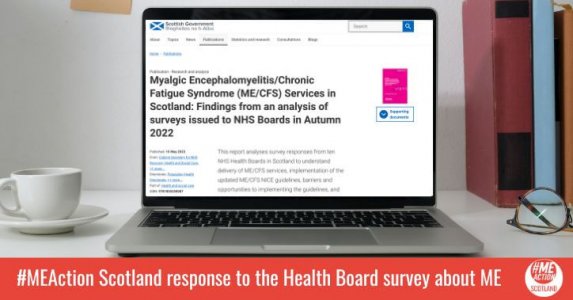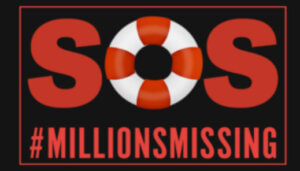On 16th May 2023, the Scottish Government published the findings from an analysis of surveys issued to NHS Health Boards to understand delivery of ME services and implementation of the updated NICE guideline.
#MEAction Scotland welcomes the survey activity and report, as it provides useful evidence about the current issues people with ME are facing across Scotland. We appreciate the acknowledgement in the report that this survey was a direct result of our meeting with the then Cabinet Secretary of Health and Social Care, Humza Yousaf, last September.
The report demonstrates a lack of understanding about ME, the discrepancy in approaches to the condition across Scotland, and the absence of provision and resources. Ten Health Boards responded to the survey, but many chose not to answer all the questions. Disappointingly, four Health Boards didn’t respond at all – they were Ayrshire & Arran, Grampian, Highland and Lothian.
None of the Health Boards demonstrated successful implementation of the NICE guideline, with most not providing the range of services needed, and some offering services that are not in line with NICE’s recommendations. We also recognise that some Boards’ responses don’t reflect the reality reported by patients, such as inaccessible service design.
Crucially, there is no mention of care or services for children and young people with ME or people with severe/very severe ME. We understand that questions were asked about these groups of patients, but that every Health Board chose not to respond to them.
The key findings and conclusions of the report are as follows:
- Further investigation is needed to understand the most effective service approach. The report suggests two approaches – specialist ME support services or integration with other long-term condition pathways, such as Long Covid and chronic pain.
- Further investigation is needed to understand whether strengthening multi-disciplinary team (MDT) approaches is the best way to provide support, or if it’s training staff to provide ME specialist care. The report notes that in some areas specialist care may not be affordable.
- NHS Boards in the survey have indicated a willingness to build education and research programmes which would decrease stigma, increase awareness and increase the intent to train in ME as a specialty.
- There is a need to commission further engagement to gather feedback from patients across Scotland.
While #MEAction Scotland appreciates the validity of the findings and conclusions in the report, this work is dependent on an increase in the availability of resource at local and national levels, which requires significant funding. Many Health Boards highlighted funding pressure and a lack of resources in their responses. These findings support our ask of the Scottish Government to commit to targeted funding that can provide people with ME across Scotland access to the support and care they deserve.
#MEAction Scotland has met with the Clinical Priorities Unit (CPU) of the Scottish Government, alongside other ME organisations, to discuss the report and highlight our concerns. We were pleased to hear that the CPU is progressing discussions with key stakeholders, such as medical royal colleges, about implementing the NICE guideline. Our team of volunteers are also working with MSPs, such as Sue Webber who led the debate on ME, to follow up with individual Health Boards about either not responding to the survey, or the gaps in the information they provided.
We will continue to work towards implementing the NICE guideline in Scotland, which the government has committed to, and this report unequivocally demonstrates how far there is to go.





